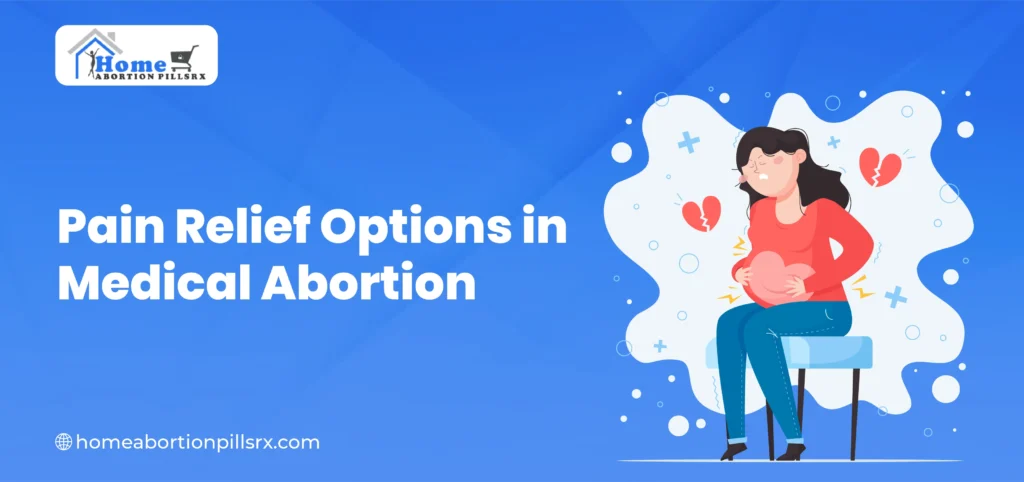Pain Relief Options in Medical Abortion

In a pregnancy termination by abortion pills, you may encounter abdominal cramps and pain. Also, body aches and tiredness are common. These are the result of hormonal changes and the action mechanism of Misoprostol (Cytolog) pills, which cause uterine contractions to expel the pregnancy from the womb. Heavy vaginal bleeding and other side effects follow. For pain management in medical abortion, you can take the help of several options, which we will discuss in the blog below.
1. Over-the-Counter Pain Medications
The easily accessible option for pain management in medical abortion is OTC (over-the-counter) medicine. The most popular one is ibuprofen, an NSAID (nonsteroidal anti-inflammatory drug). Avoid aspirin, as it may increase the risk of bleeding. This medicine is fast-acting and reduces discomfort and cramps. It also manages the pain intensity and should be taken after Misoprostol pills.
2. Medicine on a Doctor’s Slip
Those with medical conditions and vulnerable to stronger cramps may seek advice from a healthcare professional for pain medication. The suggested product can target pain pathways to address severe symptoms, which OTC tablets may not effectively manage. Knowing proper dosing is vital for such medicine and may require monitoring for medical abortion discomfort relief and cramps.
3. Warm Liquid Intake and Calming Teas
Your uterus goes through changes during pregnancy termination. Drinking warm water or herbal teas can help manage fluid balance and relax your mind and body, in turn, reducing the intensity of pain and cramps. During pain management in medical abortion, warmth from liquids (not alcohol, though) provides internal comfort. Some options are chamomile and ginger tea that soothe cramps and offer physical and emotional tranquility. They also soothe the nerves and help manage nervousness.
4. Rest in a Comfortable Position
For medical abortion discomfort relief, you must first rest in a position that makes it more comfortable to handle the side effects and pain. Some find lying curled on the side with knees elevated better, as it gives relief from cramps because of pressure relieved at the abdominal area. At the same time, use supportive pillows and dim the lighting in the room to strike a calming atmosphere. This will add to comfort and reduce physical tension, mental stress, and anxiety. Take a break in between stretches and movements to give yourself room to heal.
5. Warm Compress or Heating Pads
If you want to avoid medicines for pain management in medical abortion, look for alternatives such as heating pads or warm compresses. Applying direct heat to tensed muscles and the lower abdomen can reduce uterine cramping. These may cause a soothing effect and give relief as you get sufficient rest. The pain may not completely go away, but you may find it becoming more tolerable than before. The heat application may also make you feel more relaxed, reducing anxiety, stress, and physical discomfort.
6. Limit Physical Activities
Since you will encounter bleeding, cramps, and pain, it is best to avoid physical hardship at this time. Limit movement, but you can perform light and necessary activities, such as cleaning yourself up, fetching food, etc. This will ease medical abortion discomfort relief as you move your focus to rest rather than participating in daily chores and worrying in your mind and body. Endorphins are natural pain relievers, which are produced from mindful movement, respecting the abortion procedure needs.
7. Antispasmodic Medications
If you are worried about pain management in medical abortion, then look for antispasmodic medicines under a doctor’s guidelines. These are specifically to lower uterine spasms and muscular contractions. If the cramping is intense, these medicines can diminish the uterine function and spasmodic experience. However, painful cramping is common in a pregnancy termination, which also cleans the womb of the conception products. So, until mandatory, try the regular pain relievers, hot compress, and warm liquids instead.
FAQS: PAIN RELIEF OPTIONS IN MEDICAL ABORTION
